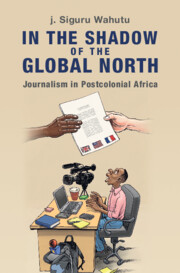Book contents
- In the Shadow of the Global North
- Communication, Society and Politics
- In the Shadow of the Global North
- Copyright page
- Dedication
- Contents
- Preface
- Acknowledgments
- Part I Making Journalists
- Part II Narrating an Atrocity
- Appendix Methodological Notes
- References
- Index
- Communication, Society and Politics
- References
References
Published online by Cambridge University Press: 13 November 2024
- In the Shadow of the Global North
- Communication, Society and Politics
- In the Shadow of the Global North
- Copyright page
- Dedication
- Contents
- Preface
- Acknowledgments
- Part I Making Journalists
- Part II Narrating an Atrocity
- Appendix Methodological Notes
- References
- Index
- Communication, Society and Politics
- References
- Type
- Chapter
- Information
- In the Shadow of the Global NorthJournalism in Postcolonial Africa, pp. 181 - 202Publisher: Cambridge University PressPrint publication year: 2024

